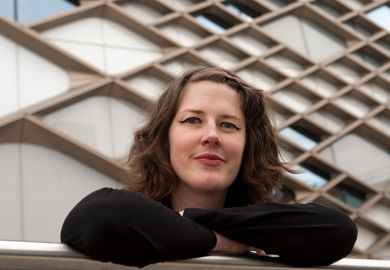This is the year I have decided to go public as the Dyslexic Professor. And, no, I don’t mean professor of dyslexia!
After failing my English O level twice, a tutor recognised that I had learning difficulties and recommended that I go to one of the UK’s few specialist testing centres, at Aston University. After what seemed like a strange set of exercises, I was told I had a very high IQ – and dyslexia. The former was a pleasant surprise and confirmed I wasn’t “stupid”. The latter was a new word to me – and unspellable to boot.
There then followed 35 years of struggles and achievements as I climbed the academic ladder, each time faced with the ubiquitous equal opportunities form, each time asking myself: “Do I have a disability? Should I declare my dyslexia? Is this process really confidential?”
The institutional perception of dyslexia as a disability is widespread. Type your university’s name and the phrase “support for dyslexic students” into Google and you will most likely be offered “disability support”, “disability and dyslexia service”, “students with Specific Learning Difficulties (SpLDs)” or some other variation of the theme. But I eventually came to realise that dyslexia is not a learning difficulty but, rather, a learning difference. This has shaped me into the person I am today, and I believe it could also provide universities with part of the answer to addressing the unprecedented challenges they face.
I was recently asked by a vice-chancellor what my career ambitions are. In an instant, I knew the answer was not “to reach the very top of academia”, and I decided to disclose my dyslexia. I listed the things I couldn’t do and that would make it hard for me to carry out the full range of duties expected of a leader in a modern university.
For example, names are difficult. Working in a leading global university constantly brings me into contact with new people, but it takes me longer than it takes others to associate a new name with a new face – and even longer to pronounce it with confidence. The role of the dean at graduation ceremonies is to read out the names and, many times, I have sat on the stage smiling and thinking: “I just couldn’t do that.”
And while years of leadership roles and countless hours of classroom teaching have made me more comfortable speaking in public – my last entrepreneurship module scored 100 per cent “strongly agree/agree” across all measures – I remain fearful of delivering the written speeches that senior leaders are regularly expected to give.
Interestingly, however, Catherine Drennan, a dyslexic distinguished professor of biology and chemistry at the Massachusetts Institute of Technology, once told a conference: “There is no dyslexia ceiling. It doesn’t exist, unless you create it in your own mind.” Recent research on the cortex suggests that dyslexia is not so much a dysfunction as a difference. We are all familiar with the Marvel comic superheroes, each with their own superpower, and I like the idea that dyslexia might be mine. More generally, this depiction suggests that it is time for us in higher education to focus less on what dyslexic people can’t do and more on what they can.
I have noticed that dyslexics appear to be able to deal particularly well with complexity: with myriad events moving with abnormal pace. This seems to arise out of dyslexics’ often heightened ability to see patterns, objects and shapes. The chances of being unable to see the wood for the trees are also particularly low among dyslexics: a result of their brains’ slower processing speed.
I’m not suggesting there are jobs that only dyslexics can do. But, like other large organisations, universities target their recruitment exclusively at top graduates from top universities, who most likely have an enhanced ability for fine-detail thinking. You also need big-picture thinking to crack the big problems facing modern universities – and societies more generally. Perhaps this is at the heart of the matter. We have designed an educational system that rewards fine-detail thinking and labels as dysfunctional the very people with enhanced big-picture thinking.
Since January, I have been posting a weekly blog on my experiences as a dyslexic academic. The response has been moving. Dyslexic academics have thanked me for breaking the taboo and professionals with dyslexic children have expressed their relief that their offspring may yet emerge into a world of enlightenment. The emotional pitch of these responses illustrates how far we still have to go. But what better place is there than the informed and forward-thinking world of higher education to start a revolution by offering advanced support to our hidden dyslexic talent – and including “evidence of overcoming the challenges of dyslexia” under desirable recruitment selection criteria?
Nigel Lockett is professor of entrepreneurship at Lancaster University and associate dean for engagement at Lancaster University Management School. Times Higher Education will be publishing more stories of disability on campus throughout the week. Follow #DisabilityOnCampus on Twitter for updates.
Register to continue
Why register?
- Registration is free and only takes a moment
- Once registered, you can read 3 articles a month
- Sign up for our newsletter
Subscribe
Or subscribe for unlimited access to:
- Unlimited access to news, views, insights & reviews
- Digital editions
- Digital access to THE’s university and college rankings analysis
Already registered or a current subscriber?







